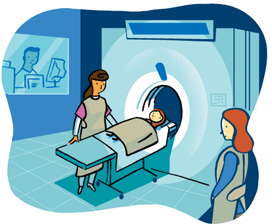Your child's scan will be done by an MRI technologist who is specially trained to do MRI scans on children, and the results will be read by the radiology doctors at the Department of Radiology at Children’s Hospital.
In the scan room will be the MRI machine. You will see a long table that will slide into tube-shaped or tunnel-like scanner where the camera is located.
Prior to the test, your child will be screened for any metal inside or outside his or her body. If your child’s clothing contains metal, he or she may be asked to change into a hospital gown. You and your child will be able to safely keep any personal belongings that contain metal in a locker during the scan.
- Your child will be asked to lie down on the table.
- The MRI technologist will place a wide strap across your child’s waist to help your child stay still during the test. If your child is having a scan of his or her head, the MRI technologist will help put his or her head into an open “headcoil,” which looks like a helmet.
- Once your child is in position on the table, the MRI technologist will move the table into the MRI scanner so that the body part of your child that is being tested is under the camera.
- The MRI machine will make loud banging and knocking noises during the scan. You and your child will be given a set of foam earplugs to help protect your ears from the noise of the scanner.
- IF your child does not need sedation, he or she may also select either music CDs or a movie to watch with special MRI goggles and headphones, instead of earplugs.
- At times during the MRI scan, the staff will not be in the scanner room with you, but will be in a room nearby where the equipment controls are located. They will be able to see you and your child through a large window and will be watching him or her constantly during the scan. An intercom system will allow you to talk to them and vice versa.
- Once the scan begins, your child will need to stay very still at all times to make sure the pictures turn out clear. At certain times, your child will be asked to hold his or her breath for a few seconds. The staff will then tell your child when to breathe out.
- Certain pictures for some MRI scans require a special liquid dye.
- This liquid dye is called “contrast.” If your child has ever had a reaction to any contrast dye, or if he or she is allergic to iodine, please let your doctor know immediately.
- The contrast will be given to your child by a nurse through an intravenous line, or IV, placed in a vein in your child’s hand, arm, or foot, depending on his or her age.
- If your child is awake during the MRI, just after the contrast goes into the vein, he or she may feel a flush of warmth as well as a funny taste in the back of his or her mouth. The warm feeling and the funny taste are normal and will go away shortly.
- When the scan is finished, the table will slide out of the scanner. Any monitoring equipment will be disconnected, and your child will be helped off of the table.
- If your child received sedation medication for the scan, he or she will be moved to the recovery area after the scan and will stay there until the medication wears off. If an IV was placed for sedation, it will be taken out by a nurse in the recovery area once your child wakes up from the medication. The length of time it takes the medication to wear off will vary, as some children take longer than others to become alert. The minimum amount of time spent in recovery is one hour.
- If your child was awake during the MRI and an IV was placed for contrast, it will be taken out by a nurse after the scan.









 At
At 
 If your child has any special needs or health issues you feel the doctor performing the scan needs to know about, please call the Department of Pediatric Radiology at Children’s before the test and ask to speak with a nurse. It is important to notify us in advance about any special needs.
If your child has any special needs or health issues you feel the doctor performing the scan needs to know about, please call the Department of Pediatric Radiology at Children’s before the test and ask to speak with a nurse. It is important to notify us in advance about any special needs.